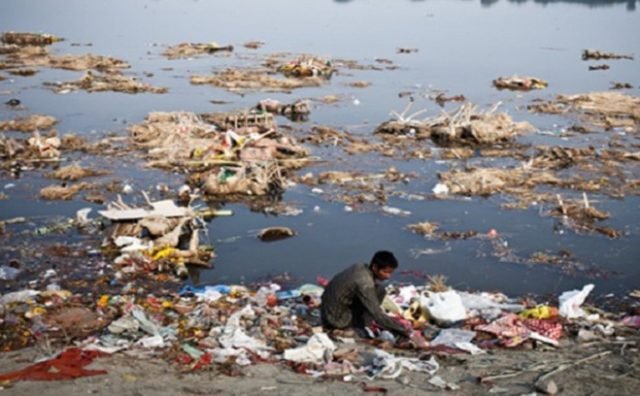We are living in unprecedented times, and our future looks uncertain. We are at the edge of an impending crisis, unfolding each day with horrible consequences on the poor and downtrodden. The crisis I am talking about is not the Pandemic but the one which led to it. Environmental degradation and Climate change are considered as one of the most pressing issues of our times. Many consider it as an existential crisis with only few years to respond. We are sitting on a time bomb waiting for it to explode. We are already witnessing the impact of this crisis in the form of extreme weather conditions, droughts, heat waves, wildfires, ocean acidification, melting of ice caps, sea level rise, collapsing ecosystems.
What we need to understand is that this is not just a scientific phenomenon, it is a crisis of social justice, a crisis of language, of failed systems and worldviews. The people who are least resilient to the impact of climate change are the ones who are going to be the most affected. We are going to witness massive migrations, civil wars, inter state wars, hunger, increased exposure to diseases, damage to infrastructure, fall in incomes.
Everything we know about the world, the way the society works, the institutions, politics, economics everything is going to be challenged and questioned. We need to act now since that’s the only right thing to do. If we don’t, history will remember us as the ones who had a chance to respond, who had the choice to do what’s right and yet didn’t do anything about it. Yet, we find ourselves debating about the reality of this crisis, about the inevitability of it, diluting the Environmental protection laws, framing anti migrant policies, following the same development model which led us in the crisis in the first place.
Religion can become a powerful part of the solution if humans embody a holistic spiritual view towards mankind, earth and cosmos. People are looking back at Religion to lead the way, Amitav Ghosh in his book The great derangement says “…involvement of religion is very important, since the present formal political structures of our time are incapable of confronting this crisis on their own since the basic building block of these structures are nation states. Inherent to it’s nature is the pursuit of the interests of a particular group of people”. One such Religion which has a long tradition of Environmental protection and conservation is Islam.
Islam views the environmental challenges as an indicator for a moral and ethical crisis.
“Corruption has flourished on land and sea as a result of people’s actions and He will make them taste the consequences of some of their own actions so that they may turn back”. (30:41)
Islamic worldview represents a unique model for a transition to sustainable development by focusing on justice, degrowth and harmony between human and nature.
“O children of Adam! … eat and drink: but waste not by excess, for Allah loves not the wasters.” ( 7:31)
“…Everything to Him is measured.” (Qur’an 13:8) “And We have produced therein everything in balance.” (55:7)
“You who believe, uphold justice and bear witness to God..” (4:135)
To overcome environmental crisis and mitigating the impact of climate change, from an Islamic perspective is underpinned by defining the role of humans as trustees and stewards (khalifah). This balance has been disturbed because of human choices which result in over consumption, over exploitation and overuse of resources. The privilege to use the natural resources was given to the mankind on a guardianship basis, which implies the right to use another person’s property on the promise that it will not be damaged or destroyed.
“It is He who has appointed you viceroys in the earth … that He may try you in what He has given you.” (6:165)
The Holy Qur’an has a number of specific references to ecology and also contains some important principles for environmental conservation. The Hadiths of the Holy Prophet give high degree of importance towards sustainable cultivation of land, waste minimization, humane treatment of animals, preservation of natural resources and protection of wildlife.
“If a Muslim plants a tree or sows seeds, and then a bird, or a person or an animal eats from it, it is regarded as a charitable gift (sadaqah) for him.” (Bukhari)
The Prophet said, “Whoever kills a sparrow or anything bigger than that without a just cause, Allah will hold him accountable on the Day of Judgment.” The listeners asked, “O Messenger of Allah, what is a just cause?” He replied, “That he will kill it to eat, not simply to chop off its head and then throw it away.” (An-Nasa’i)
One day Prophet (s.a.w.) passed by Sa`d ibn Abi Waqas (r.a) while he was performing wudu’. The Prophet (saw) asked Sa`d: “What is this wastage?” Sa`d replied: “Is there wastage in wudu also?” The Prophet said, “Yes, even if you are at a flowing river.”(Ibn Majah)
The Islamic jurisprudence had evolved numerous ways to protect land, forests and wildlife, they created inviolable zones, known as Haram and Hima, in which resources were to be left untouched. Haram areas were drawn up around wells and water sources to protect the groundwater from over pumping. Hima applied to wildlife and forestry and designated an area of land where grazing and woodcutting was restricted, or where certain animal species (such as camels) were protected.
One of the most compelling arguments for the need of religion to lead the way to solve this crisis as Noami Klein says is the intrinsic nature of religion to push people towards radical and profound change which would take secular movements years. And as Ghosh says ” Religious worldviews are not subjected to the limitations of current existing institutions of governance, they transcend nation states, partake economistic ways of thinking. Capable of imagining noon linear change“.

